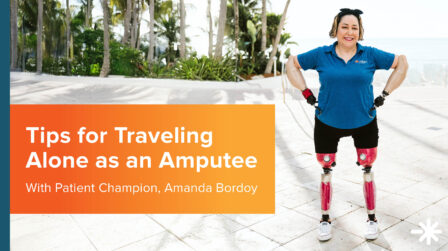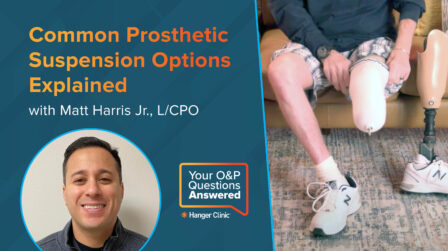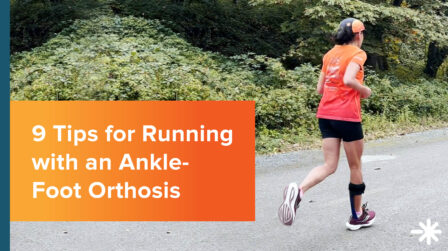12 Tips for Making Holiday Travel More Accessible
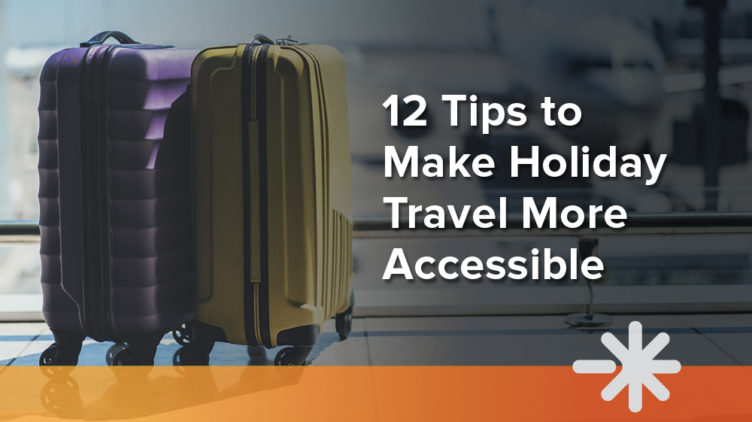
The holiday travel season is upon us. With security measures and screenings at airports, getting from point A to point B can take more planning for people with mobility challenges. Here are 12 tips to help you feel prepared and make traveling with your orthotic or prosthetic technology easier this holiday season.
For many, the holidays mean traveling to see family or friends. While traveling can be an exciting and fun time, it can also be stressful navigating to your destination. We sat down with Matthew Brewer, a bilateral above-knee amputee who shared his journey learning to walk again after limb loss in 2019, to put together 12 tips for traveling this holiday season.
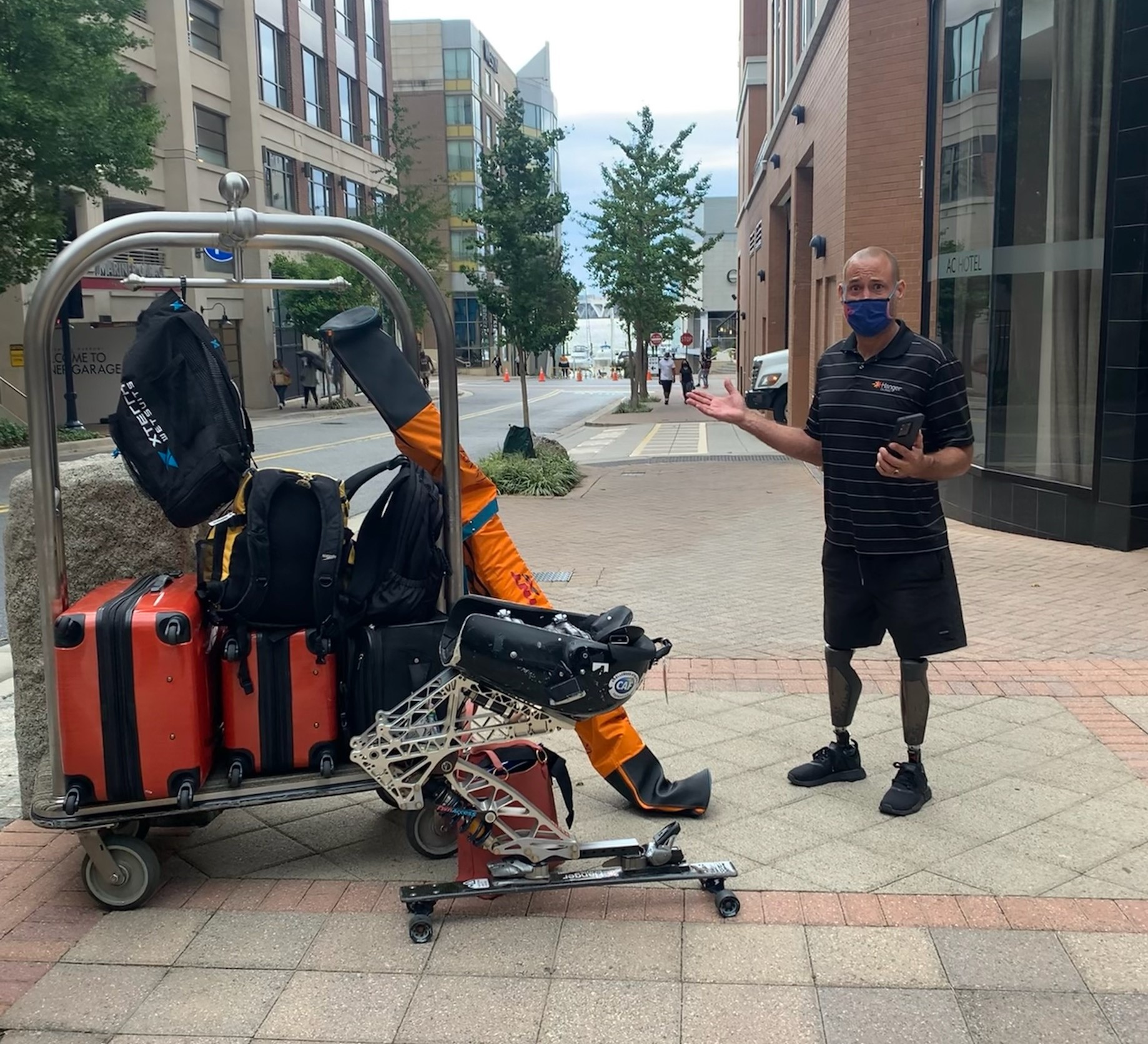
12 Tips for Traveling with Orthotic or Prosthetic Technology
1. Book Non-Stop Flights When Possible
Plan ahead to minimize the amount of time you spend in airports if possible. Save your energy for spending time with family and friends. Matthew shares, “I try to book direct flights versus having layovers whenever possible. I also download the airline app for the airline on which I’m traveling. In addition to conveniently storing my flight information, the app has a map of the airport and terminals, so I can plan ahead by looking at how long my walk will be and if I would like to request a wheelchair for larger airports or far away terminals.”
2. Collect Important Contact Information in One Place
Remember to take with you all of the important phone numbers, email addresses, vaccine cards, and contact information for your orthotist or prosthetist. Hanger Clinic has locations nationwide that can help should you need any clinical care while you are traveling.
3. Check Your Baggage
It may be difficult to haul your luggage through the airport. Check your luggage, so you can focus on getting to your gate and not have to worry about carrying it with you.
4. Get to the Airport Early
It takes time to get through the airport, from when you park to going through security and getting to your gate. Some airports are considerably larger than others. Plan to arrive early to allow yourself extra time. Consider arriving two to three hours in advance.
5. Going Through Airport Security
It takes time for everyone to get through security, but with an orthotic or prosthetic device you will most likely require additional screening. Be prepared for the extra screening, pat downs, and swabs that may occur. Dress accordingly so you can easily show your devices when requested.
Matthew reminds us, “Be patient with security agents, and remember they are not intentionally trying to slow you down. They have a required screening process they must follow. It’s just part of their job. If they ask me to remove my shoes, I simply say it’s not standard procedure and I should be able to leave my shoes on. If they are new to the job or anything feels uncomfortable or unordinary, ask to have a supervisor present. They typically have more experience with additional screening procedures.”
For more details about airport security and medical devices, check with the TSA.
6. Getting Through the Airport
Airports can be very exhausting, even for able-bodied people. Consider requesting wheelchair assistance to be set up in advance, especially if you struggle with slopes and ramps. Requests for a wheelchair can be made when booking your flight or by calling your airline carrier 48 hours prior to your departure. Another option is to request or flag down a transportation cart once you get through security.
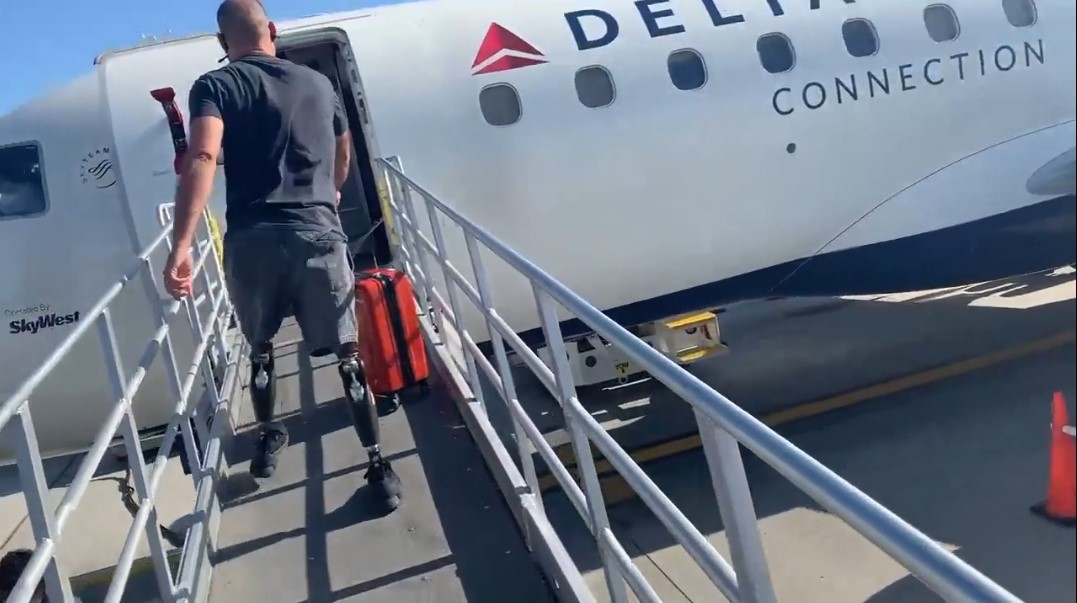
7. Boarding the Airplane
Request pre-boarding to more easily access the plane and have additional time to get to your seat.
8. Sign Up for Pre-Check
Minimize hassle and time spent in line. TSA PreCheck will ensure a speedier, more straightforward screening process after an agent has verified your identity.
9. Bring Spare Equipment
Medical devices travel for free. If an airline wants to charge extra for a bag that contains parts or supplies, just let them know that the bag contains medical devices; the bag should go free of charge. Note that this only applies to bags that contain only medical devices, but some airlines are more strict than others on this rule.
Matthew said, “Being proactive and prepared for potential issues you may run into with your orthosis or prosthesis might save you some headache. Bring screwdrivers, spare screws, and any other items you frequently need to keep your devices working. They won’t add much weight to your luggage and will allow you to travel with peace of mind. As a bilateral above-knee amputee, stubbies are a big part of my mobility tools as well as any assistive devices, canes, walkers, or crutches you may use. You never know what terrain you may encounter while traveling, so it’s best to be prepared.”
10. Consider Alternate Forms of Transportation
If you find navigating through the airport difficult, consider traveling by car, train, or bus. There are even travel agencies that specialize in accessible travel if you prefer that option.
Matthew added in, “If needed, you can rent a car with hand controls. Most rental car companies do not advertise that they offer hand controls, but if you call their 800 number and provide them at least 48-hours notice, they can have hand controls available at no charge to the renter.”
11. Be Mindful of Hygiene
Travel exposes you to more people and places than your everyday life. Make sure you bring whatever you need in order to keep your orthosis, prosthesis, and skin clean and disinfected. Chlorine wipes, rubbing alcohol, and skin ointments in travel-sized containers that are 3.4 ounces or less are great in your travel bag.
12. Give Yourself a Chance to Rest
Holidays can be filled with scheduled activities and gatherings. Make sure to schedule in some down time when you can focus on relaxation.
Matthew summed everything up by saying, “If you haven’t taken that first trip yet, plan ahead the best you can and just go for it when it comes to traveling. When I realized I could walk through an airport if I didn’t rush myself, traveling gave me a sense of independence and empowerment. While it may take more planning, the rewards of visiting new places and seeing people you love are worth it.”
Request a Free Evaluation
If you or someone you love are looking for personalized, high-quality care, get in touch with a board-certified orthotist or prosthetist at a Hanger Clinic near you.
Latest Updates
Subscribe to stay up-to-date on our latest posts.

